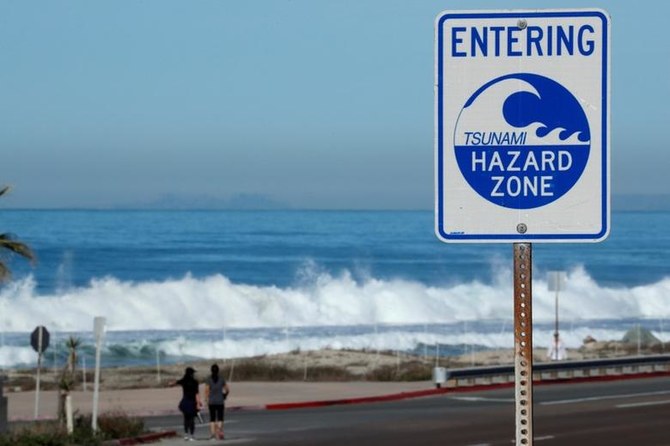WELLINGTON: A 7.7 magnitude earthquake struck the South Pacific region on Thursday, triggering tsunami warnings and calls for residents to avoid beaches and shore areas.
The European Mediterranean Seismological Center (EMSC) said the 7.7 magnitude quake’s epicenter was 417 km (258 miles) east of Tadine, New Caledonia, and at a depth of 10 km (6.2 miles).
Australia confirmed a marine tsunami threat to Lord Howe Island, a marine reserve more than 700 kilometers (450 miles) northeast of Sydney, but said evacuations were not necessary.
New Zealand authorities urged residents along its northern coast to avoid beaches and shore areas.
The New Zealand National Emergency Management Agency said people should get out of the water, off beaches and away from harbors, rivers and estuaries in areas from Ahipara to Bay of Islands, Great Barrier Island and from Matata to Tolaga Bay.
“We expect New Zealand coastal areas to experience strong and unusual currents and unpredictable surges at the shore,” the agency said in a statement.
“Strong currents and surges can injure and drown people. There is a danger to swimmers, surfers, people fishing, small boats and anyone in or near the water close to shore.”
The quake, whose strength was upgraded from an earlier magnitude of 7.2, followed at least three other tremors in the region with magnitudes ranging from 5.7 to 6.1 in a span of just over an hour.
The US Tsunami Warning System said a tsunami watch was in effect for American Samoa and cited a potential for tsunamis in other regions including Vanuatu, Fiji and New Zealand.
Waves reaching up to a level of 1 meter (3.3 feet) above the normal tide level were possible for some coastal areas of Vanuatu, Fiji and New Zealand, it added.


New Zealand, Australia on tsunami watch after strong South Pacific quake
New Zealand, Australia on tsunami watch after strong South Pacific quake

Mali, Burkina say restricting entry for US nationals in reciprocal move
ABIDJAN: Mali and Burkina Faso have announced travel restrictions on American nationals in a tit-for-tat move after the US included both African countries on a no-entry list.
In statements issued separately by both countries’ foreign ministries and seen Wednesday by AFP, they said they were imposing “equivalent measures” on US citizens, after President Donald Trump expanded a travel ban to nearly 40 countries this month, based solely on nationality.
That list included Syrian citizens, as well as Palestinian Authority passport holders, and nationals of some of Africa’s poorest countries including also Niger, Sierra Leone and South Sudan.
The White House said it was banning foreigners who “intend to threaten” Americans.
Burkina Faso’s foreign ministry said in the statement that it was applying “equivalent visa measures” on Americans, while Mali said it was, “with immediate effect,” applying “the same conditions and requirements on American nationals that the American authorities have imposed on Malian citizens entering the United States.”
It voiced its “regret” that the United States had made “such an important decision without the slightest prior consultation.”
The two sub-Saharan countries, both run by military juntas, are members of a confederation that also includes Niger.
Niger has not officially announced any counter-measures to the US travel ban, but the country’s news agency, citing a diplomatic source, said last week that such measures had been decided.
In his December 17 announcement, Trump also imposed partial travel restrictions on citizens of other African countries including the most populous, Nigeria, as well as Ivory Coast and Senegal, which qualified for the football World Cup to be played next year in the United States as well as Canada and Mexico.
In statements issued separately by both countries’ foreign ministries and seen Wednesday by AFP, they said they were imposing “equivalent measures” on US citizens, after President Donald Trump expanded a travel ban to nearly 40 countries this month, based solely on nationality.
That list included Syrian citizens, as well as Palestinian Authority passport holders, and nationals of some of Africa’s poorest countries including also Niger, Sierra Leone and South Sudan.
The White House said it was banning foreigners who “intend to threaten” Americans.
Burkina Faso’s foreign ministry said in the statement that it was applying “equivalent visa measures” on Americans, while Mali said it was, “with immediate effect,” applying “the same conditions and requirements on American nationals that the American authorities have imposed on Malian citizens entering the United States.”
It voiced its “regret” that the United States had made “such an important decision without the slightest prior consultation.”
The two sub-Saharan countries, both run by military juntas, are members of a confederation that also includes Niger.
Niger has not officially announced any counter-measures to the US travel ban, but the country’s news agency, citing a diplomatic source, said last week that such measures had been decided.
In his December 17 announcement, Trump also imposed partial travel restrictions on citizens of other African countries including the most populous, Nigeria, as well as Ivory Coast and Senegal, which qualified for the football World Cup to be played next year in the United States as well as Canada and Mexico.
© 2025 SAUDI RESEARCH & PUBLISHING COMPANY, All Rights Reserved And subject to Terms of Use Agreement.












